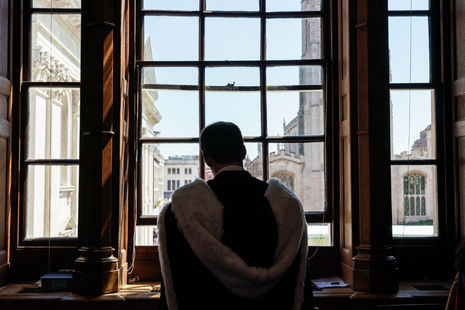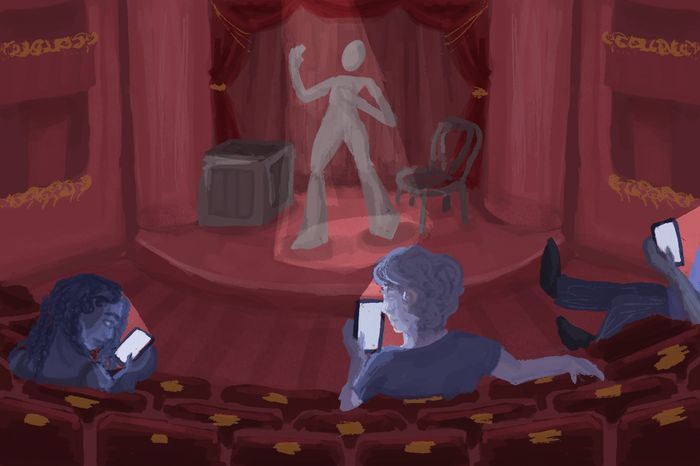Do Cambridge audiences actually get theatre?
Leon Rake thinks Cambridge theatre is more about being seen than truly watched

There’s a kind of applause that rings hollow. You hear it often in Cambridge – enthusiastic, well-meaning, yet curiously empty. It isn’t exactly dishonest, it’s just not entirely connected to the work on stage. It’s the sound of friendship, not engagement; of obligation, not reckoning. In these moments, one can’t help but wonder: is anyone really watching the play?
To observe Cambridge student theatre is to witness a strange and delicate paradox. On one hand, the scene is vibrant – restless with talent and opportunity, and capable of remarkable work. On the other, it unfolds within a small, self-conscious world where identity and output are closely intertwined. Here, criticism rarely lands cleanly. When a production falters, the conversation often drifts from the work to the one critiquing it. Soon, it’s not the piece under scrutiny, but the etiquette of reacting to it. Theatre here is rarely just theatre. It’s also community, reputation, friendship, and favour. And when an audience walks in carrying all of that, it changes what theatre is allowed to be.
“The issue isn’t that praise comes first – it’s that it often comes alone”
I’ve been to shows where it felt like the audience was composed almost entirely of friends and romantic entanglements. Not in itself a bad thing – support is a vital part of any artistic environment – but there’s something uneasy about a room where responses feel pre-ordained. Laughter arrives early, applause resounds, and in the bar afterwards, conversation, quite naturally, gravitates toward praise. It’s time for flowers, for toasts, for the shared relief of a show completed. What’s more telling is how infrequently this deepens into reflection. When criticism surfaces, it tends to do so belatedly, in hushed tones, and only at a comfortable remove from those involved. The issue isn’t that praise comes first – it’s that it often comes alone.
It’s easy to understand how this dynamic arises. Cambridge is a small place, and student theatre is deeply social. Friends cast friends, and most of us have at some point flyered half our college asking people to come see a show. None of that is inherently bad. Community matters. But when the theatre becomes primarily a social event, something changes in the nature of the audience. People come to be supportive, not to be challenged. They come to clap.
This culture of polite consensus might seem harmless, even kind. But its effects are more corrosive than we often admit. Theatre relies on tension –between performer and audience, between comfort and discomfort, between what we expect and what we’re given. When an audience is unwilling to be challenged or to respond honestly, that tension disappears. What’s left is theatre as social performance: safe, palatable, eager to please.
For many, student theatre offers a welcome space for creativity, connection, and the pleasure of performance. That spirit is part of what makes it so compelling. Yet this atmosphere, however benign, carries its own quiet influence. It fosters an unspoken preference for work that affirms rather than challenges, that entertains rather than unsettles. Directors and writers, sensitive to the tastes of their peers, learn quickly what will be warmly received.
Of course, not all student work is made to be refined. Sometimes, the value lies simply in the act of making – in expression without expectation. But when the ambition is to improve or sharpen craft, it raises a question: in the absence of considered feedback, what exactly is the work meant to grow from? Without a culture of engagement, development becomes a matter of guesswork.
“A truly generous audience does not merely applaud; it thinks”
There’s also the matter of standards. Theatre is an art form that demands rigour, and rigour thrives under pressure. If an audience expects nothing more than a competent run-through and a familiar face, why should performers stretch themselves beyond the minimum? The lack of genuine critical response can erode ambition. Not because students aren’t talented, but because ambition needs friction. Without it, theatre becomes decorative.
And yet, audiences must be careful here. There is nothing admirable in cynicism for its own sake. Theatre is, at its best, a space of generosity – a mutual giving between those who make and those who receive. But generosity does not mean indulgence. It means attention. It means curiosity. It means the willingness to be moved or unsettled or bored, and to admit it. A truly generous audience does not merely applaud; it thinks. It questions. It offers something back.
The challenge for the audience is to cultivate a culture in which support and critique are not opposed, but in conversation. Cambridge theatre doesn’t need a harsher audience; it needs a braver one. Braver in its watching, braver in its talking, braver in its expectations. To sit in the dark and genuinely engage with what is in front of you is an act of respect. To speak honestly afterwards is another.
If this university is serious about being a place where future artists are shaped, it must also shape audiences. That doesn’t mean every student must approach theatre with professional intent. Many are here to take part for the joy of it. But even within that spirit, there’s room for attentiveness and care. An audience need not be expert to be engaged – but it must be willing to show up out of more than just loyalty or routine. Not as consumers of a social product, but as part of an ongoing dialogue. That dialogue begins when the lights go down, but doesn’t end when the applause begins.
 News / Right-wing billionaire Peter Thiel gives ‘antichrist’ lecture in Cambridge6 February 2026
News / Right-wing billionaire Peter Thiel gives ‘antichrist’ lecture in Cambridge6 February 2026 Features / From fresher to finalist: how have you evolved at Cambridge?10 February 2026
Features / From fresher to finalist: how have you evolved at Cambridge?10 February 2026 Film & TV / Remembering Rob Reiner 11 February 2026
Film & TV / Remembering Rob Reiner 11 February 2026 News / Churchill plans for new Archives Centre building10 February 2026
News / Churchill plans for new Archives Centre building10 February 2026 News / Epstein contacted Cambridge academics about research funding6 February 2026
News / Epstein contacted Cambridge academics about research funding6 February 2026










